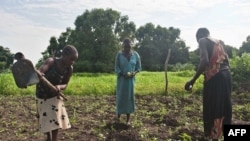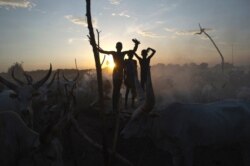Ten traditional chiefs from South Sudan’s Central Equatoria state have demanded the state government stop a campaign of illegal land grabs and are threatening the use of force unless officials intervene.
In an open letter dated February 10 and addressed to the state governor, Emmanuel Adil Anthony, the chiefs accused armed individuals, internally displaced persons (IDPs) and militias from Bor and the Bahr el Gahzal of orchestrating the land grabs in the villages of Mogiri, Bilinyang, Garbu, Kubi Timan and Gumbo.
Marino Marcellino, head chief of Tokiman village, said some residents of Bor who were displaced by recent floods in Jonglei state had seized plots in his area and were selling them using fake title deeds.
“Those are all people from Bor. They are the ones grabbing the land. You go to Gumbo market — it is all grabbed,” Marcellino told VOA’s South Sudan in Focus. “The market that was well-demarcated and its land documents distributed has all been grabbed. It’s now all white iron sheets. I have my own land there. I made [built] a foundation, but when I went to check, I found it was grabbed. I told them it’s my place. They told me this is South Sudan and it’s their place.”
Relocation of IDPs urged
In their letter, the chiefs called for the immediate relocation of IDPs back to their areas of origin. The chiefs also requested the removal of security personnel who have been stationed at Rejaf Payam to address issues related to land grabs.
The chiefs said their desire to embrace coexistence and peace should not be taken as weakness.
“Honorable Governor, let the government not force us to take the law in our own hands or use jungle laws to defend our ancestral land. Hence, we will appreciate if the state government could respond within a short period [as] possible,” the chiefs wrote.
South Sudan government spokesperson Michael Makuei, who also serves as the chairperson of the Bor Community in Juba, said farmers and cattle keepers could live together if they agreed to resolve land disputes.
“President [Salva Kiir] has ever been clear. He has been saying that the cattle and the farms can coexist. Even if you go to Bahr El Ghazel [area], wherever you go where cattle keepers are, they cultivate, and they don’t destroy crops, and nobody complains about it.”
Makuei said if cattle enter a farm and destroy it, the owner of the farm should open a case and there will a compensation paid for the destroyed crops.
Marcellino said some of the land grabbers were armed and were allocating land using fake documents and stamps. He said some of the IDPs were also destroying crops by grazing their cattle on farmlands of the host community.
Plan to investigate
Derick Derickson, press secretary in the office of the governor of Central Equatoria state, said the governor was aware of land grabs and intended to form a committee to investigate the issue.
Derickson said that early this year in Juba, the state governor formed a committee to facilitate talks between famers and herders to address conflict over land grabs.
“One of the resolutions was for the immediate removal of these cattle keepers from the places they have occupied, and probably to the places of their origin, and they were given a duration, a time frame of one week, which I think is not happening speedily,” he said.
Most homes in the town of Bor and some areas in Twic East county were submerged in a devastating flood in January that displaced 200,000 people. Most families affected by the floods fled to Central Equatoria state and were resettled temporarily at Mangala County.

